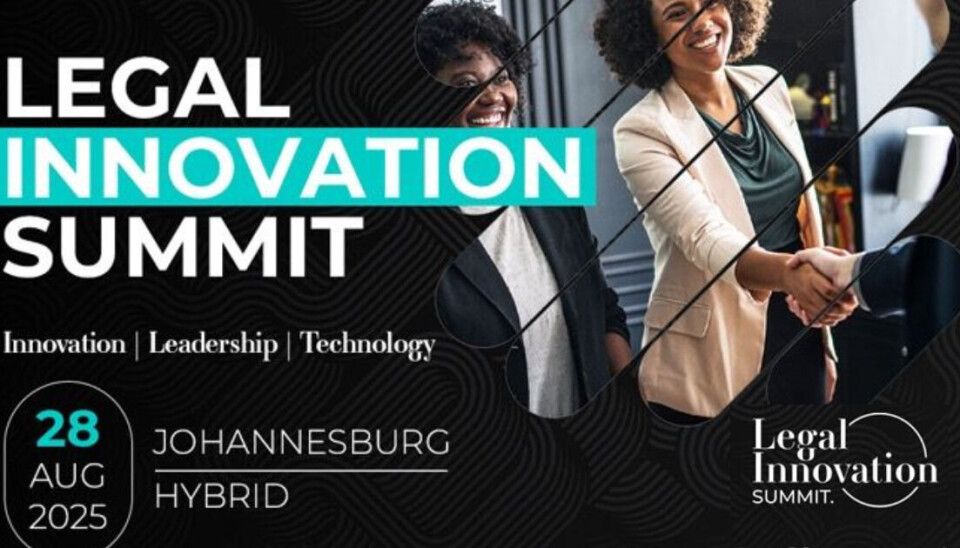Copyright : Re-publication of this article is authorised only in the following circumstances; the writer and Africa Legal are both recognised as the author and the website address www.africa-legal.com and original article link are back linked. Re-publication without both must be preauthorised by contacting editor@africa-legal.com
International and local experts to gather in South Africa to explore profound transformation of Africa’s legal industry

On 28 August, the inaugural Legal Innovation Summit will be held in Johannesburg. It will bring together the sharpest minds in legal practice, tech, and policy to unpack how innovation is reshaping the legal profession across Africa.
The advancement of AI is so rapid that it’s likely we’ll see more innovation and change in legal practice in the coming five years than we’ve seen in the past twenty years of modernisation and transformation, says Professor Richard Susskind CBE, who will give the Opening Keynote for next month’s Legal Innovation Summit 2025.
“In the short term, the dominant use of AI in the law will be reassuringly familiar - as a productivity and efficiency tool for lawyers,” says Susskind. “In the longer run, though, AI will surely play a more transformational role, in empowering people who are not lawyers to undertake at least some of their own legal work. My great hope here is that we will use AI to solve the global access-to-justice crisis.”
Susskind, the world's most cited author on the future of legal services and President of the Society for Computers and Law, is one of many global and local experts who will be part of the inaugural Legal Innovation Summit in Johannesburg on 28 August.
At a time when the legal industry across the world is undergoing a profound transformation, driven by rapid tech advances, shifting economic forces, and evolving regulations, the Summit aims to provide “a powerful platform to exchange knowledge, gain practical insights, and equip legal professionals with the tools, networks, and strategies needed to remain relevant, efficient, and future-ready.”
The organisers believe that African law firms, organisations, and regulators are uniquely positioned to “leapfrog into next-generation legal solutions” - as other African industries such as fintech have done in their sphere - “with innovation grounded in local realities and scalable across jurisdictions”.
Hosted by CatalyNT, in partnership with Financial Mail and Business Day, the Summit brings together general counsel, law firm partners, legal technologists, regulators, and academics to unpack how innovation is reshaping both the practice and business of law in Africa, and to confront big questions including what it means to practice law in a digital age, how to lead legal teams through rapid transformation, and what frameworks are needed for AI, ethics, and regulatory agility.
Following Susskind’s opening keynote, there will be panel discussions and fireside chats exploring AI Governance, Cybersecurity & Ethics; Innovating Legal Service Design & Delivery; and Leadership, Culture & Business Alignment; before a closing session on What CEOs Expect from Legal Partners, then networking drinks.
The rapid escalation of tech advancements and the subsequent transformation of legal practice in Africa and globally brings challenges and opportunities, says Aalia Mane, Head of Webber Wentzel Fusion, who is speaking at the Summit. Lawyers will need to train and learn differently, but this may also lead to a better quality of life.
“Everyone thinks about AI as an efficiency gain,” says Mane. “But we like to think about it and go beyond that, to look at effectiveness, at insights, and about the opportunity to refocus time and energy towards things that matter more.”
Private banker turned international tech speaker Samke Mhlongo will MC the Summit, with some other panelists and speakers including Lydia Shadrach-Razzino (Head of M&A at Baker McKenzie South Africa); Pavel Matthews (Principal Legal Counsel of ABSA Group); Mahashane Shabangu Myakayaka (Global Legal Counsel Lead AI & Data Governance, Sandvik); Leah Molatseli (founder, Contract Alchemists); Naomi Thompson of CatalystNT; Ashlin Perumall (Head of IPTech at Baker McKenzie South Africa); and Zoe Mabie of Women in Tech, Google.
Find out more about Legal Innovation Summit 2025’s agenda, speakers, and how to register here.
